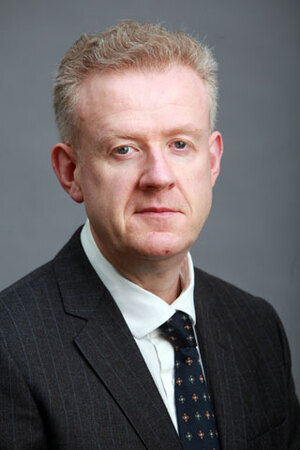

From top: Patrick Treacy and April Duff
Further to new proposals that would entail the Deaprtment of Education ‘encouraging‘ the Catholic Church to transfer patronage of primary schools.
Patrick Treacy SC, of new lobby group ‘Faith in our Schools’ and April Duff, chairperson of Education Equality, spoke to Seán O’Rourke on RTÉ Radio One this morning.
Mr Treacy, who runs a ‘domestic centre of Christian spiritually’ called Integritas, in Stoneyford, Co. Kilkenny, argued that he actually wanted more divestment.
Patrick Treacy: “We’re in favour of divestment because we want Catholic schools to be really Catholic, and Protestant schools to be really Protestant. And what we believe is that when parents start to see Catholic schools and Protestant schools really living out the Christian philosophy and understanding…”
Seán O’Rourke: “And are there Protestants in your group?”
Treacy: “Well, for instance, my wife is Protestant and just to say this, I have four children. And my three sons are Catholic and my daughter is Protestant and we send all of our four children to an Educate Together school and we actually live through the very thing that April is talking about and it’s an absolute superb school in Kilkenny. But the problem is, we know from experience that what April is actually suggesting doesn’t work, it doesn’t work. Because what Catholic schools need to learn from Educate Together, which is a huge gift, that Educate Together give is that they really show you the importance of parental involvement. That’s what we’ve got to bring in, in particular to Catholic schooling. We’ve got to move away from this mentality that the parent is left outside the school gate. The parent has got to come right into the school but the problem is, is that we need Catholic and Protestant schools to permeate the ethos throughout the invisible pedagogy, so to speak, throughout the entire working day, or sorry, the entire school day, I should say.”
O’Rourke: “What do you say that to that, April?”
April Duff: “I think the main point to make is that we don’t live in an ideal world. And, even if we did, we couldn’t have a Muslim school and a Hindu school and a Jewish school and a Scientology school in every single area where there is one child. So this idea that you have a right to be educated in accordance with a particular religious belief and for that to be the only, the only ethos that’s within that school, just isn’t sustainable because you can’t have that for every single religious belief and every…”
O’Rourke: “So on the basis of that logic then, there should be no schools based on any particular ethos, except where there’s a sufficient population to allow for one for everybody in the audience, as it were.”
Duff: “No the school should cater for everybody. I mean, remember, the purpose of schools is to educate. We’re talking about education here. These aren’t religious institutions, they’re educational institutions, they’re institutions to educate people. Remember, those schools are paid for by the taxes, sorry, by the taxpayer and people – atheist parents, Muslim parents and Catholic parents – all pay the same taxes. So the schools simply have to accommodate everybody and have to respect religious freedom of everyone. And the current system simply does not respect religious freedom. Because, first of all, you’re penalised in accessing school because, if the school is oversubscribed, you won’t get in unless you have a baptismal cert or if you don’t belong to the right religion. So you’re penalised for the exercise of your religious right at that point and then, once you’re in the school, you don’t have a right to continue your religious belief without another…”
O’Rourke: “OK..”
Duff: “…religion being imposed on you.”
O’Rourke: “Brief response to that, Patrick Treacy.”
Treacy: “Well just to say, unfortunately, there’s been a gross exaggeration of the position in relation to the baptism requirement. The actual position there is that only 1.6% of Catholic primary schools have an oversubscription problem – 3.69% in Dublin. That’s the first thing, the second…”
O’Rourke: “But it doesn’t get away from her substantial point that she makes about what the children are subjected to, if you like – and I know that’s probably a loaded phrase – in the course of the school day.”
Treacy: “Well can I just say this, let’s just be clear about one thing we can all agree on too. The word education comes from the Latin ‘edu cara’. It means to ‘lead out’. Now you either accept that your child is a spiritual being or that your child is not a spiritual being. The vast, vast, vast majority of parents believe that their child is spiritual, all right? So if you want to create a schooling system that denies the spiritual basis of the child, that in my view is not education.”
There you go now.
Meanwhile…

The debate followed an interview on RTÉ Radio One’s Morning Ireland with Education Minister Richard Bruton.
Mr Bruton spoke about the Government’s plans to transfer patronage of primary schools from the Catholic church.
During the interview, presenter Gavin Jennings reminded Mr Bruton that there are more than 3,000 primary schools in Ireland and 90% of them are still run by the Catholic church.
Mr Bruton said:
“We are committed to trebling the rate at which there is new options emerging, with a target of 400 schools which would be, you know, multi-denominational, over the next 15 years. So that would be trebling the rate at which we develop new options for people.”
Mr Jennings also asked Mr Bruton how many Catholic primary schools had been divested so far. Mr Bruton said 11 while Mr Jennings said some reports claim that the figure is just two.
In addition Mr Jennings asked Mr Bruton if schools will continue to be allowed to prioritise pupils on the basis of their religion.
Mr Bruton replied:
“The provision in the existing bill, there’s a lot of valuable things there and I think it’s very important to say what’s in it. It provides that there must be a written policy, it provides that children with special needs cannot be discriminated against, it provides that parents must, you know, be consulted in respect of any changes in that policy. Parents must have an opportunity to review, there can’t be discrimination in different areas.”
“Now the issue of whether an oversubscribed school, that is a religious ethos, can, if you like, choose a child of a religious background over those of a non-religious background, that is a thorny issue which the last committee recognised, raised, you know, difficult Constitutional issues.”
“And I will have to sit down with colleagues in the Oireachtas to discuss how we handle that because we don’t have a majority. There will be different views on how to handle this and indeed whether it can be done within the Constitution. But that will be something that I will sit down and discuss with others in the Dáil so that we can have not just the good elements of the existing admissions bill but have a debate about that issue as well.”
Listen back here





